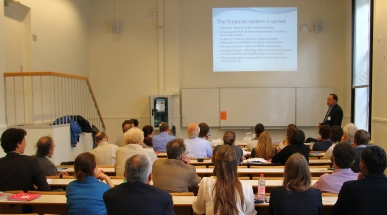
Lobby for transparent figures on tax avoidance
Researchers, investigative journalists and NGOs are going to work more closely together to interpret the consequences of the international tax regime, e.g. tax avoidance by multinationals and loss of income for developing countries. ‘Particularly research into international capital flows has a high priority now. It is very difficult to compare international data and to be able to calculate how much income tax revenue developing countries are missing out on due to tax avoidance practices, such as often occur in the Netherlands, also,’ says Katrin McGauran, SOMO researcher of the financial sector.
On 8 June, SOMO held a Tax Seminar to bring together international researchers, journalists and civil society organisations to strengthen the investigation of tax avoidance, to exchange knowledge and to possibly develop a joint research agenda. Among those present were political scientists, lawyers, economists, NGOs from the Tax Justice Network and reporters from the Dutch newspaper Het Financieele Dagblad (FD).
McGauran: ‘Insufficient research has been done on the volume of profits being channelled through the Netherlands and concerning how much income developing countries, as well as OECD countries, may be missing out on. To remedy this we want to promote collaboration between investigative journalists, academics and NGOs, as well as raising more funds.’
‘Researchers are liable to lose themselves in the data, while NGOs really need more statistical foundation for their account of the impact of tax avoidance on poor countries as well as on EU member states, now being hit hard by the crisis. As the series of features Tax route NL(opens in new window) in the FD has shown, investigative journalists can now play a big role in the public exposure of outrages. Two journalists were recently awarded the Citi Journalistic Excellence Award for their work on that series.’
With respect to channelling interest revenues and royalties, the Netherlands is well known among multinationals as a safe haven for special financial institutes (BFIs) such as mailbox companies. ‘The Dutch Ministry of Finance has reviewed the requirements for these companies to see if they should be made stricter and it reached the conclusion that the current so-called substance requirements are sufficient. This finding totally disregards reality: tax advisors and trade magazines have written extensive articles on how Dutch legislation and the treaty network can be used to lower and circumvent taxation. Nevertheless, the Ministry of Finance continues to claim that the existing legislation is sufficient to prevent abuses.’ As Rodrigo Fernandez (SOMO/University of Amsterdam) said during the Tax Seminar: ‘How big does the loss of income of developing countries have to be before the Netherlands considers it immoral?’
The European Commission (EC) seems more proactive. In May the European Parliament adopted a resolution in which it calls for stricter measures against tax avoidance. The EC presents proposals for country-by-country reporting, requiring corporations to report per country where they make investments. McGauran: ‘This is a good development, but we have to wait and see how effective the definite regulations will be. For example, bizarrely but possibly it may include a clause stating that the new regulations are not applicable if national legislation states that certain payments may not be disclosed. Mind you, in EU countries such national legislation does not exist. But it does offer a way out if member states were to introduce that national legislation.’
At an international level, it is essential to achieve a greater role for the Tax Committee of the United Nations. McGauran: ‘A multilateral approach to the tax system is crucial for the developing countries. Currently, in the bilateral tax treaties they don’t stand a chance against the army of negotiators brought to bear by OECD countries. The very system of bilateral treaties is what is perpetuating tax avoidance. We are for political initiatives that give the United Nations more say regarding international profit allocation.’
The seminar participants expressed their desire to strengthen cooperation on research and lobbying. SOMO will contribute to this in the next year through research and seminars at the university. Additionally SOMO is developing new research methods to incorporate the subject of taxation as an integral part of its corporate research.
Find out more about Tax Justice Nederland(opens in new window) .
Do you need more information?
-

Jasper van Teeffelen
Researcher
Related news
-
The Netherlands – still a tax haven Published on:
 Arnold MerkiesPosted in category:Publication
Arnold MerkiesPosted in category:Publication Arnold Merkies
Arnold Merkies
-
 Tax avoidance in Mozambique’s extractive industriesPosted in category:Long read
Tax avoidance in Mozambique’s extractive industriesPosted in category:Long read Vincent KiezebrinkPublished on:
Vincent KiezebrinkPublished on: -
The treaty trap: The miners Published on:
 Vincent KiezebrinkPosted in category:Publication
Vincent KiezebrinkPosted in category:Publication Vincent Kiezebrink
Vincent Kiezebrink

